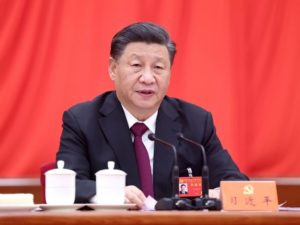With Biden’s national security team focused intently on Russia’s invasion of Ukraine, it’s fair to ask who’s watching China. The recent coming together as best friends forever of Presidents Vladimir Putin and Xi Jinping cannot be ignored as a geopolitical tag-team threat. When the sanctions on the Kremlin begin to bite, count on Xi coming to the financial aid of Putin. Furthermore, while Defense, State, and the National Security Council are tied up planning to thwart Russia’s complete takeover of Ukraine, the People’s Republic of China (PRC) and whatever escapades it has in mind in the Indo-Pacific region cannot go unattended.

Xi Jinping (Photo by Ju Peng/Xinhua via Getty Images)
The single greatest fear the Biden administration should have is that President Xi perceives his American counterpart’s disastrous handling of the retreat from Afghanistan and the recent failure of U.S.-led diplomacy to prevent Russia’s invasion of the Donbas region of Ukraine as evidence of weakness. That perception by Beijing could lead to the PRC seeing an open door to a more aggressive military action in the South China Sea and against Taiwan. Moreover, there is probably little doubt among the Chinese Communist Party (CCP) members that Biden’s foreign policy and defense team is on the ropes dealing with the Ukraine border crisis.
What might give Beijing pause in becoming too aggressive in the Pacific and elsewhere, however, is its own economic and military ties with the players in Ukraine drama unfolding. There is a reason the Russian president has courted and been received warmly by Xi. The West has threatened sanctions on the Kremlin should Ukraine be invaded for the last year. That was more than enough time to cement a financial relationship between Moscow and Beijing. “A lot of talk about economic sanctions is really a pie in the sky because China is now Russia’s banker. Xi Jinping will back Putin if sanctions from the West come,” explained Robert Wilkie, former Under Secretary of Defense for Personnel Readiness in the Trump administration in a statement to Fox News.
But on the flip side, Russia supplies $27.3 billion, or 15.5%, of China’s crude oil. That is substantial in a world that has an insatiable thirst for energy. By comparison, the United States provides Beijing only $6.3 billion, or 3.6%, of the PRC’s imported crude oil. Consequently, the CCP has a vested interest in keeping the Moscow-Beijing connection alive and well. However, what complicates the Putin-Xi relationship is the financial ties between the PRC and Ukraine. As Jude Blanchette and Bonny Lin explained for Foreign Affairs:
“If Beijing had its way, it would maintain strong ties with Moscow, safeguard its trade relationship with Ukraine, keep the EU in its economic orbit, and avoid the spillover from U.S. and EU sanctions on Moscow—all while preventing relations with the United States from significantly deteriorating.”
But it’s not just the PRC’s relationship with Ukraine that is jeopardized. Furthermore, by supporting Russia during the period of U.S. and European sanctions, effectively diminishing the impact, Xi runs the risk of antagonizing his western Europe market. The game is more complicated because it takes the financial benefit of market forces to pay for military weapons, equipment, and training.
 Moscow and Beijing have in the past year, while Putin has had his forces poised on Ukraine’s border, been engaged in an unprecedented number of combined training and exercise events. These activities have been with ground and naval forces. Chinese media outlets have also supported Russia through information or “hybrid” warfare. The PLA Daily, a CCP state-run news outlet, called the U.S. and NATO “provocateurs” against Russia and stressed the Kremlin’s “legitimate security concerns” that should be “taken seriously,” Defense One reported.
Moscow and Beijing have in the past year, while Putin has had his forces poised on Ukraine’s border, been engaged in an unprecedented number of combined training and exercise events. These activities have been with ground and naval forces. Chinese media outlets have also supported Russia through information or “hybrid” warfare. The PLA Daily, a CCP state-run news outlet, called the U.S. and NATO “provocateurs” against Russia and stressed the Kremlin’s “legitimate security concerns” that should be “taken seriously,” Defense One reported.
The specter of the U.S. facing two adversaries at the same time is frightening. “The potential flashpoint that could lead to such a situation would be the simultaneous decision by Beijing to use force to reunify Taiwan and Moscow to use force to conquer two provinces in eastern Ukraine,” Daniel Davis explained a year ago in an article titled “Would Russia Invade Ukraine, And China Invade Taiwan Simultaneously?”
The first shoe has dropped. Russian military forces attacked Ukraine. Despite the economic ties binding China to Europe and the U.S., the opportunity to be an occupier of – or, at a minimum, a greater threat to – Taiwan may be too irresistible to the PRC.
The views expressed are those of the author and not of any other affiliation.
~ Read more from Dave Patterson.



